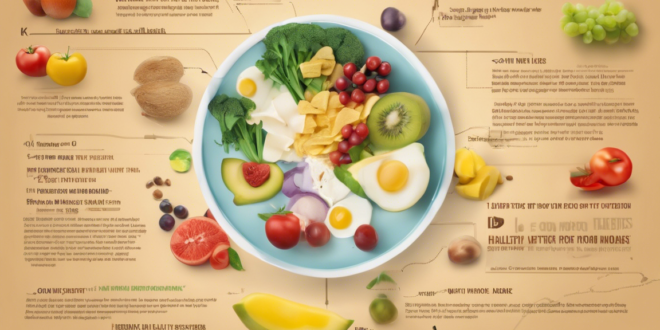How to Meal Prep for a Busy Week: Mastering Nutrition and Time Management
In today’s fast-paced world, maintaining a healthy diet while juggling work, family, and personal commitments can feel like an impossible challenge. Meal prepping emerges as a strategic solution that transforms your approach to nutrition, saving time, reducing stress, and ensuring you consume balanced, wholesome meals throughout the week.
Understanding the Power of Meal Preparation
Meal prepping is more than just a trendy kitchen strategy—it’s a lifestyle approach that empowers individuals to take control of their nutritional intake. By dedicating a few hours each week to planning, cooking, and portioning meals, you can dramatically improve your dietary habits, save money, and reduce the temptation of unhealthy fast food or impulsive eating.
Benefits of Consistent Meal Preparation
1. Nutritional Control: When you prepare meals in advance, you have complete oversight of ingredients, portion sizes, and nutritional balance. This approach allows you to carefully curate meals that meet your specific health goals, whether you’re looking to lose weight, build muscle, or maintain overall wellness.
2. Time Efficiency: The average American spends approximately 37 minutes per day preparing meals. Meal prepping can reduce this time by up to 70%, freeing you to focus on work, family, fitness, or personal development.
3. Financial Savings: Eating out or ordering takeout can cost significantly more than home-prepared meals. By meal prepping, you can save an estimated $100-$250 per month, depending on your current dining habits.
Essential Tools for Successful Meal Preparation
To start your meal prep journey, invest in high-quality storage containers. Look for:
– BPA-free plastic containers
– Glass containers with secure lids
– Compartmentalized meal prep containers
– Microwave and dishwasher-safe options
Step-by-Step Meal Prep Strategy
1. Planning Phase
– Review your weekly schedule
– Choose recipes that can be easily scaled and stored
– Create a comprehensive grocery list
– Select a dedicated prep day (typically Sunday)
2. Grocery Shopping Tips
– Buy in bulk when possible
– Choose versatile ingredients
– Opt for fresh, seasonal produce
– Consider frozen vegetables as convenient alternatives
3. Cooking and Storage Techniques
– Batch cook proteins like chicken, turkey, and tofu
– Prepare versatile grains such as quinoa and brown rice
– Roast vegetables in large batches
– Use airtight containers to maintain freshness
– Label containers with preparation dates
Balanced Meal Prep Recipes
1. Protein-Packed Breakfast Jars
– Greek yogurt
– Chia seeds
– Fresh berries
– Honey or maple syrup
– Nuts for crunch
2. Mediterranean Chicken Bowls
– Grilled chicken breast
– Quinoa
– Roasted vegetables
– Tzatziki sauce
– Feta cheese
3. Vegetarian Buddha Bowls
– Roasted sweet potatoes
– Black beans
– Kale
– Avocado
– Tahini dressing
Food Safety and Storage Guidelines
– Refrigerated meals typically last 3-4 days
– Freeze meals that will be consumed later in the week
– Always reheat to appropriate internal temperatures
– Use a food thermometer to ensure safety
Common Meal Prep Mistakes to Avoid
1. Overcomplicated Recipes: Start simple and gradually increase complexity
2. Poor Ingredient Selection: Choose ingredients that retain flavor and texture
3. Inconsistent Storage: Invest in quality containers
4. Neglecting Variety: Rotate recipes to prevent boredom
Technology and Meal Preparation
Leverage technology to enhance your meal prep experience:
– Meal planning apps
– Digital recipe databases
– Grocery delivery services
– Smart kitchen scales
– Programmable slow cookers and instant pots
Customizing Meal Prep for Different Dietary Needs
Whether you’re following keto, vegan, gluten-free, or balanced diet plans, meal prepping can be adapted to your specific nutritional requirements. Consult with a registered dietitian to create personalized meal strategies that align with your health goals.
Conclusion: Transforming Your Relationship with Food
Meal prepping is more than a technique—it’s a commitment to your health, time, and personal well-being. By implementing these strategies, you’ll not only simplify your weekly nutrition but also gain greater control over your diet and lifestyle.
Remember, successful meal preparation is a skill that improves with practice. Start small, remain consistent, and watch as this powerful strategy transforms your approach to nutrition and time management.
 Good Calories Guide GoodCalories Guide focuses on nutrition, healthy eating, and overall wellness. The site offers practical insights into evidence-based dietary practices, including tips for specific lifestyles such as veganism, keto, and family-friendly meal planning. It also addresses unique nutritional needs for individuals with conditions like diabetes or food allergies, while providing quick and accessible recipes to make healthy living a sustainable and enjoyable choice.
Good Calories Guide GoodCalories Guide focuses on nutrition, healthy eating, and overall wellness. The site offers practical insights into evidence-based dietary practices, including tips for specific lifestyles such as veganism, keto, and family-friendly meal planning. It also addresses unique nutritional needs for individuals with conditions like diabetes or food allergies, while providing quick and accessible recipes to make healthy living a sustainable and enjoyable choice.


